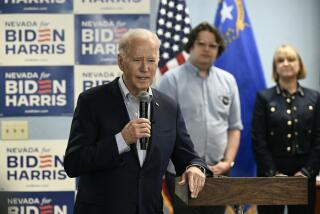Obama adopting a more partisan tone
- Share via
Reporting from Denver — Even as President Obama crosses the country selling his jobs plan, his advisors aren’t banking on an economic turnaround to make voters more upbeat about his record come the 2012 election.
During his three-day Western swing, Obama faithfully pitched his $447-billion proposal, asserting that it would give the wheezing economy a lift by putting more money in workers’ pockets and 2 million people back to work.
But his campaign team concedes that game-changing drops in the unemployment rate won’t happen any time soon. For Obama to win reelection, his advisors say, he needs to shift the focus from his stewardship of the economy to the stark choice confronting voters about the nation’s political leadership.
That requires a more partisan, campaign-style message, which Obama used on this trip: Republicans need to be defeated, not accommodated. In Washington state, California and at a Denver high school on Tuesday, Obama infused his speeches with an edge reminiscent of the 2010 midterm election campaign.
He also started to single out Republican presidential candidates. At a fundraising event in San Jose on Sunday, Obama criticized Texas Gov. Rick Perry for “denying climate change” even though his state is “on fire,” noting the wildfires there amid one of the worst droughts in recent history — a condition that some experts blame in part on climate change.
And he presented himself as a middle-class “warrior” combating a Republican Party determined to protect the affluent.
“This election isn’t only going to be about reliving the past,” said a top Obama campaign advisor, speaking on condition of anonymity to discuss strategy. “Most Americans are very concerned about the future and the direction we’re going to take. They understand the problems that we’re dealing with were a long time in the making, and they understand that it’s going to take more time than anyone would like to work our way out of it.”
Obama’s spicier rhetoric has delighted his core supporters. Many Democrats saw the president as too accommodating to the GOP in the summer deal to end the debt ceiling crisis.
“What a lot of people have been waiting for is for him to fight back,” said Eric Bauman, chairman of the Los Angeles County Democratic Party.
Obama is tapping into resentment over the growing concentration of wealth in fewer and fewer hands. The argument reinforces his call for curbing long-term deficits through a mix of spending cuts and tax increases on the wealthiest Americans.
It also helps the president forge an emotional connection with his base, especially minorities and working-class voters who have been falling behind.
Over the last three decades, income inequality has widened. In 1979, the wealthiest 1% of the population claimed 9% of the nation’s pretax income, according to the Congressional Budget Office. By 2006, that income figure had doubled to 18.1%. Over the same period, the bottom 80% of the population saw its share of the pie shrink.
The White House and the Obama campaign are calling attention to these trends. In a blog post Monday, communications director Dan Pfeiffer used statistics to show that households averaging about $400,000 a year have been “earning a larger and larger share of our nation’s income.”
The next day, the Obama campaign picked up the thread. In a speech in New Hampshire, senior campaign advisor David Axelrod cited government figures showing that a typical white male worker is earning no more today than in 1973.
Axelrod bemoaned “the hollowing-out of the middle class in this country that threatens to change the character of our country and the basic assumptions that we have about our country.”
That theme is surfacing in more of Obama’s speeches.
Speaking at the Denver high school, Obama invoked the GOP’s accusation that he incites class warfare: “If asking a millionaire to pay the same tax rate as a plumber makes me a class warrior, a warrior for the working class, I will accept that.… The only warfare I’ve seen is the battle that’s been waged against middle-class families in this country for a decade now.”
More to Read
Sign up for Essential California
The most important California stories and recommendations in your inbox every morning.
You may occasionally receive promotional content from the Los Angeles Times.













